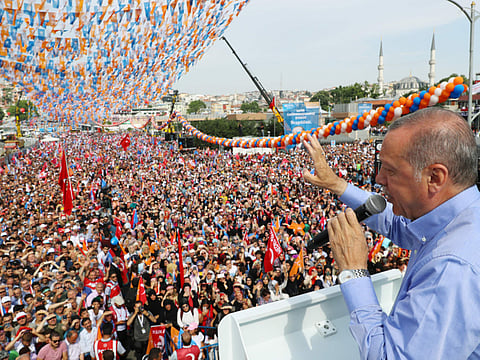Erdogan has turned into a geostrategic threat
Turkey has ceased to be an ally of Europe and the US and, if he wins, the Turkish leader is likely to foment further instability in Syria and the region

The prospect of a triumphantly re-elected Recep Tayyip Erdogan armed with sweeping new presidential powers is deeply alarming to many Turks, but it is also a scary prospect for the international community. Since taking national office 15 years ago, Erdogan has turned from neighbourhood bully-boy into geostrategic threat. Under his choleric, resentful tutelage, Turkey has ceased to be a reliable friend of Europe and the US. If he gets his way in yesterday’s polls, Erdogan is likely to foment further instability in Syria and throughout the Middle East region.
Despite his egregious abuses of civil and human rights, the mass arrests that followed the failed 2016 coup, and his contempt for Turkey’s secular democratic institutions, including independent media, Istanbul’s former mayor remains a potent force.
Erdogan’s personalised politics, underpinned by support from nationalists, observant Sunnis and rural conservatives, and sustained by deliberately divisive, populist policies, represent a big challenge for foreign partners.
Ahmet Davutoglu, an amiable professor who was Erdogan’s chief adviser, foreign minister and prime minister from 2003 to 2016, helped promulgate a “zero problems with neighbours” foreign policy that initially brought positive regional advances. So-called “neo-Ottomanism” was, briefly, all the rage. But as Davutoglu’s influence faded, Erdogan — always quick to imagine a slight or find a grievance — reversed course. Relations with Egypt, a key Arab power, are a case in point. Erdogan’s ambition to be a leader for the entire Muslim world climaxed in September 2011 when he visited Cairo shortly after the Arab spring revolt that toppled Hosni Mubarak.
But when Mubarak’s Muslim Brotherhood successor, Mohammad Mursi, was ousted, Erdogan all but declared war.
Erdogan is still bent on creating a new Ottoman sultanate. But his idea is a far cry from the benign construct envisaged by Davutoglu. On the contrary, it thrives on problems with neighbours. The rift with Cairo endures. And Erdogan has also fallen out with the Gulf states over continuing links to the Muslim Brotherhood, Ankara’s perceived military ambitions, and its de facto alliances with Iran and Qatar.
As a politician feeding on friction and strife, such divisions are grist to Erdogan’s mill. By creating notional national enemies, he wins votes, or at least he thinks he does. Thus the current campaign has seen escalating Turkish military operations inside northern Iraq, on the Kandil mountains border with Iran, where the outlawed Kurdish group the PKK is based. Neither Tehran nor Baghdad has given permission for these dangerous armed encroachments — but, in his hubris and arrogance, Erdogan does not care.
According to the Turkish army, dozens of PKK militants were “neutralised” in Iraq and south-east Turkey last week. Such random violence is entirely typical of Erdogan’s crude overall approach to the “Kurdish problem”, which he in any case claims, preposterously, to have solved. Kurdish civilians bear the brunt of his failure. Pro-Kurdish politicians, such as his presidential rival, Selahattin Demirta, campaigning from behind bars, end up in jail — or worse.
Erdogan’s Kurdish obsession is exacerbating conflict along the Syria-Turkey border, too. The decision earlier this year to invade Afrin, in north-west Syria, was dictated by his wish to repulse pro-Western Syrian Kurdish forces, not to help US and allied fighters combat Daesh (the self-proclaimed Islamic State of Iraq and the Levant) or assist anti-Al Assad rebels. To avert a military clash between US and Turkish forces around Manbij, the Trump administration shamelessly instructed the Kurds, its only reliable local allies, to surrender a town they had bravely liberated from Daesh. The pattern repeats around the region. Erdogan has picked a fight with an old enemy, Greece, in recent weeks, sending aircraft to buzz Greek islands after Athens refused to hand over suspects in the 2016 coup. This confrontational behaviour has brought talk of war — a not wholly improbable outcome, given the escalating dispute over energy exploration rights off still-divided Cyprus. Similarly, past attempts to improve relations with Israel have been abandoned in favour of resumed, politically expedient enmity, justified most recently by Erdogan’s claim to care about dead Palestinians in Gaza.
The overall picture reflects a broader deterioration. Last week the US Senate tried to block the big-ticket sale of F35 fighter jets to Turkey after members of Congress accused Erdogan of “actively operating to undermine US interests around the world”. Turkey, they said, “has made a common practice of aggressively targeting US allies while aiding and abetting our adversaries”. That’s an extraordinary way to talk about a Nato ally.
Likewise, Erdogan’s damaging rows with European countries over refugees and future EU membership, his brute defiance of human rights norms and shared democratic standards, and his growing military collaboration with Vladimir Putin, symbolised by the purchase of advanced Russian S400 missiles, seem certain to get worse if he wins a new five-year term. Turkey’s voters have a duty to the world, not just to themselves. Kick him out.
— Guardian News & Media Ltd
Simon Tisdall is a foreign affairs commentator.


